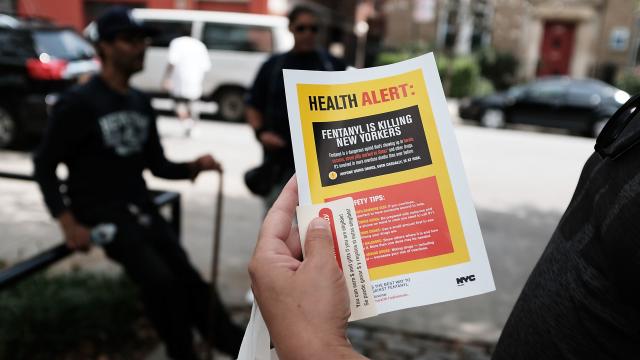Starting in 2015, doctors in Massachusetts began noticing a wave of typically young patients coming down with unexplained, sometimes permanent short-term memory loss. The only connection found between these patients was a history of recreational drugs; either heroin or cocaine. But these drugs almost never cause the kind of brain damage that results in amnesia, leading the doctors to believe something else had to explain why so many people were losing their memories at the same time.
A new case report, published today in the Annals of Internal Medicine, might solve the puzzle once and for all: It suggests that a powerful, previously rare opioid – fentanyl – is most responsible for the symptoms.
The report details a 30-year-old Maryland man with a history of heroin use who had recently returned home from a residential addiction treatment program. He had been sober for over a month, but one morning, family members found him in his room with drug paraphernalia. At first, the man was hard to wake up, and once he awoke, he couldn’t stop asking the same questions over and over, which worried his family enough to take him to a local hospital. After being transferred to another hospital in West Virginia with “persistent memory impairment,” the man was tested for drugs and his brain was scanned via MRI.
The man showed the same sort of lesions along his hippocampus (and basal ganglia) that others have had. He tested positive for cocaine, but his urine also contained the broken-down remnants of fentanyl. It’s the first case of this “amnesiac syndrome” that has been definitively linked to fentanyl; other victims have only been tested for or reported general opioid use.
“We are getting more and more evidence that fentanyl plays an essential role in this syndrome,” Alfred Demaria, an epidemiologist and medical director of the Bureau of Infectious Disease at the Massachusetts Department of Public Health (MDPH), told me. Demaria is not affiliated with the current report, but he and his colleagues at the MDPH have worked with some of its co-authors to track cases in the state.
The lesions seen in these patients were caused when the brain’s oxygen flow to the hippocampus was temporarily cut off. A cocaine or heroin overdose can stop a person’s breathing and heart. But fentanyl, its analogs, and other synthetic opioids are much more potent than heroin, making an overdose likelier. Fentanyl might also act independently on the hippocampus to help cause the syndrome.
“It seems to rev up the metabolism of the hippocampus,” Demaria explained. This supercharging then might make the effects of any oxygen deprivation to the area caused by an overdose all the more damaging. “But the exact mechanisms of how this happens is going to be beyond [what we can find] from survelliance,” he added. “We need more research.”
Fentanyl being the primary culprit also lines up well with the timeline of cases. In 2016, the MDPH looked through old hospital records, eventually finding 14 people within the state whose symptoms fit the bill for the syndrome. But the cases only dated back to 2012, with most having occurred after 2014. Right around that same time, fentanyl use started becoming more common.
The drug is regularly prescribed by doctors as a powerful painkiller following major surgery, but the kind available illicitly has been mostly shipped over from China. The drug and its nearest cousins are typically cheaper to produce than heroin, and less is needed to accomplish the same high, so dealers are incentivized to sell it. Oftentimes, though, users don’t even know they’re taking fentanyl, since many dealers secretly cut their marketed heroin or other drugs with it. This surge in fentanyl and other synthetic opioids has also led to more deaths. In 2016, they were responsible for more than half of the fatal overdoses seen across at least 10 states and around 20,000 deaths total that year.
According to Demaria, the tally of known amnesia cases is now somewhere around 20. But while the current report details a Maryland patient, he hasn’t heard of any dedicated effort to track cases elsewhere. Doctors and health departments have certainly become more aware of the syndrome and even reach out to the MDPH for advice, Demaria said, but it’s difficult for anyone to justify devoting limited resources to study an interesting, but seemingly rare side-effect of fentanyl overdoses when there are much more pressing things to worry about.
“We’re faced with this dilemma that we have thousands of people dying of overdoses,” he said. “We’re struggling with a huge epidemic; we’re struggling to keep people alive.”
That isn’t to say that those afflicted by the syndrome have necessarily been fortunate. At least two of the 14 patients the MDPH initially studied in 2016 were found to have memory and learning impairments more than a year after their initial amnesia. So it’s likely that many overdose survivors’ ongoing cognition problems have gone unnoticed by doctors.
“It’s another consequence of this terrible epidemic of opioid use, especially with the introduction of fentanyl,” Demaria said “We’re seeing more overdose deaths and more frequent injections, which leads to more bloodborne infections… it’s really a bad circumstance we’re in right now.”
